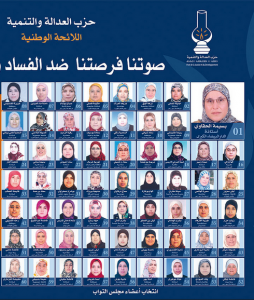 As Morocco prepares for parliamentary elections this Friday, check out this campaign poster by the Party of Justice and Development (Islamists) from @__Hisham (a great person to follow on Twitter for insightful Morocco-related info, btw). It’s what some in Morocco are referring to as the PJD’s female “Dream Team.” It is, of course, interesting because it, on the one hand, touts the PJD’s efforts to show that, while conservative, it promises to be inclusive to women. On the other hand, all of the women featured on the poster are wearing hijabs—a reaffirmation that the PJD is still a conservative, Islamist party. So, while we’re on the subject, I’m going to go ahead and talk about what’s on everybody’s mind for the elections on Friday…are the Islamists going to win?
As Morocco prepares for parliamentary elections this Friday, check out this campaign poster by the Party of Justice and Development (Islamists) from @__Hisham (a great person to follow on Twitter for insightful Morocco-related info, btw). It’s what some in Morocco are referring to as the PJD’s female “Dream Team.” It is, of course, interesting because it, on the one hand, touts the PJD’s efforts to show that, while conservative, it promises to be inclusive to women. On the other hand, all of the women featured on the poster are wearing hijabs—a reaffirmation that the PJD is still a conservative, Islamist party. So, while we’re on the subject, I’m going to go ahead and talk about what’s on everybody’s mind for the elections on Friday…are the Islamists going to win?
First, let’s be clear on who Morocco’s PJD really is. Yes, they are Islamists. (Though some refer to the PJD, tongue in cheek, as “les Islamistes Light.”) No, unlike many other Islamists parties in the region, they are not extreme, but quite moderate. (Actually, not even all women in the PJD wear hijabs.) Yes, the PJD is an “allowed” political party in Morocco. (In fact, it has been active and worked within Morocco’s democracy since the late 1990’s and currently holds 14% of seats in the lower house of Parliament, the second largest party.) Is the PJD’s political agenda radical and religiously based? No. Experts often note that “indeed, the PJD intentionally downplays any religious agenda.” One of the reasons that the PJD has been so popular among Moroccans is that, while they do represent conservative, religious based principles, their platform focuses on democracy and human rights reform, education and social development and business/trade.
The PJD is not without controversy though. They did strongly oppose a proposed reform of Morocco’s new Constitution which guarantees “freedom of belief”, which they claim would have led to the promotion of non-Islamic values such as breaking the Ramadan fast in public, sexual openness and homosexuality and secular agendas behind laws in a Muslim country. One PJD candidate recently claimed during a campaign speech that God would “doubly” bless those who voted for the PJD, while those who voted for any other party would receive a mere single serving.
So, are the Islamists going to win a majority of seats or not? While there are varying opinions and lots of buzz, many are saying that the answer is no. Salaheddine Mezouar, Morocco’s current Finance and Economy Minister and member of the newly formed Coalition for Democracy (a secular group and the main challenger to the PJD) says that,
“Morocco is different. It is not Tunisia, nor is it Libya or Egypt. […] Here in Morocco we have a plurality. Morocco has never known one-party rule. Moroccan political parties have practiced democracy and are well-educated, which makes an outcome of that kind (an Islamist victory) improbable.”
I tend to agree with Minister Mezouar. Though, I think that most believe that, even if the PJD wins, the overall commitment to moderation, democratic reform and advancement in Morocco (shared by Islamists and secularists) will prevail. They key is going to be, as we all know, will les Marocains turn out the vote?